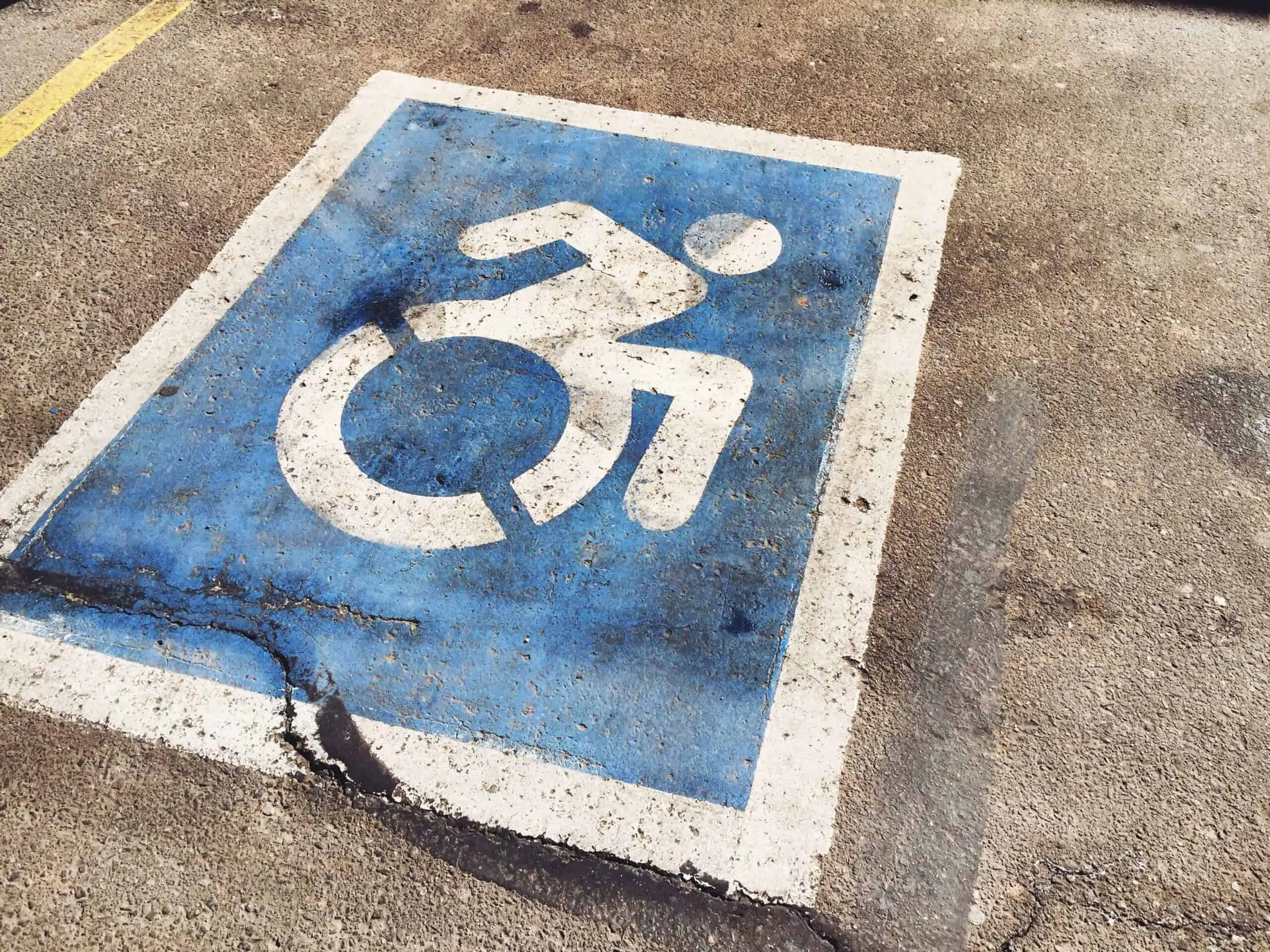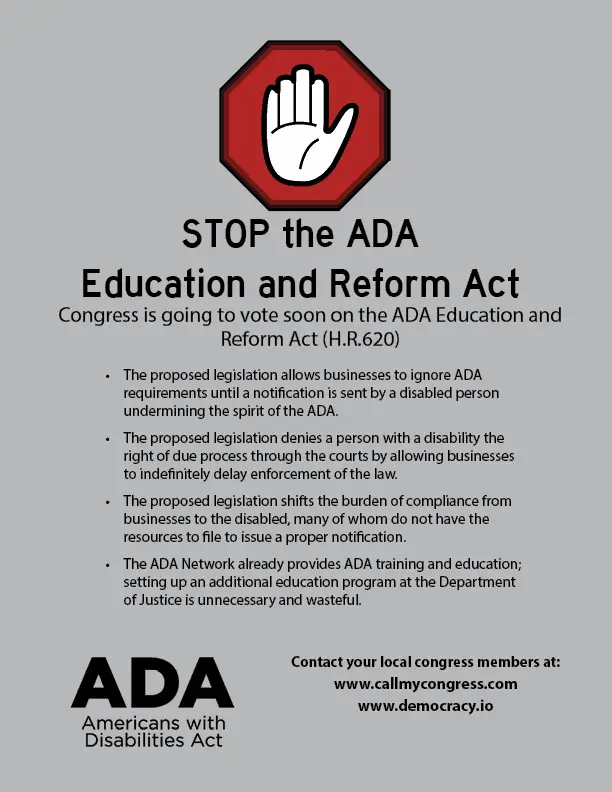Stop the ADA Education and Reform Act
The ADA Education and Reform Act of 2017 allows business to ignore ADA requirements until a notification is sent by a disabled person, and denies persons with disabilities their right to due process through the courts, shifting the burden of compliance from businesses to the disabled
The Americans with Disabilities Act (ADA) of 1990 (amended in 2008) is a bipartisan law that sets accessibility standards that businesses open to the public must follow, so that those with disabilities can work, shop, dine, and play just like any other citizens. Title III of the ADA requires basic necessities like ramps, handicap parking spaces, and doorways wide enough for a wheelchair. Even under current law, the accommodations must not place an “undue burden” on the business, and be “readily achievable”. In other words, the accommodations must be practical and affordable. As a result of 27 years of building access equality, these features have become so ubiquitous that it’s easy for anyone to take them for granted. However, the enforcement mechanism that has been in place for nearly three decades is now in jeopardy because of H.R.620 -- The ADA Education and Reform Act of 2017, sponsored by Rep. Poe, Ted [R-TX-2].
Currently, if a business does not meet the basic accessibility standards that have been established in the Americans with Disabilities Act (ADA) for 27 years, they can be sued under Title III of the ADA to compel the business to comply with the law. There are no financial penalties – the plaintiffs can’t shake businesses down for money. Businesses in violation of the ADA are only required to bring their property into compliance with the law, and repay the plaintiff’s attorneys fees.
What would the ADA Education and Reform Act do?
The ADA Education and Reform Act would require the the Department of Justice to set up a new program to educate state and local governments and business owners of their obligations under ADA. However, federally-funded nationwide ADA training, education, and assistance already exists. The education piece is a smokescreen for the reform part of the legislation, which adds more red tape to the process for those requirements to be enforced, while opening loopholes for businesses to avoid compliance and litigation entirely.
Before an ADA Title III lawsuit could be initiated. a disabled person (referred to in the law as an “Agitated Person”) must notify the business of the specific violation, including citing the exact provision of ADA Title III that is being violated. Therefore, an impacted disabled person must either:
- Become a self-taught expert on ADA Title III requirements
- Rely on non-profits that are already overworked
- Pay an attorney out-of-pocket, with no way to recover legal fees
After receiving notification, the business would have 60 days to acknowledge the violation, and another 120 days to make “substantial progress” towards remedying the violation. Businesses would have no obligation to be accessible until such a complaint is received. Even then, as the ACLU mentions, this time period could be extended indefinitely , as long as the business claims to continue to be making “substantial progress” towards a remedy, denying people with disabilities their right to obtain a court order to enforce compliance with a 27 year old law.
How would this affect disabled people?
This offensive legislation would segregate the disability community, making it the only protected class under civil rights law that must rely on “education” – rather than strong enforcement – to guarantee access to public spaces. As the Consortium for Citizens with Disabilities Rights Task Force and other civil rights organizations wrote in opposing this bill, “We know of no other law that outlaws discrimination but permits entities to discriminate with impunity until victims experience that discrimination and educate the entities perpetrating it about their obligations not to discriminate.”
Sen. Tammy Duckworth, U.S Army combat veteran
What can I do to help stop this bill?
Call, mail, and/or email your elective representatives, and let them know that you oppose H.R.620 - The ADA Education and Reform Act of 2017. Here are some points to mention:
- The ADA Network already provides ADA training and education; setting up an additional education program at the Department of Justice is unnecessary and wasteful
- Under current law, the accommodations must not place an “undue burden” on the business, and be “readily achievable”, and plaintiffs cannot seek financial damages beyond recovering legal fees
- The proposed legislation allows business to ignore ADA requirements until a notification is sent by a disabled person, undermining the spirit of the ADA that all public businesses must be accessible from the start
- The proposed legislation would deny persons with disabilities their right to due process through the courts, by allowing businesses to indefinitely delay enforcement of the law through continuous claims of “substantial progress”
- The proposed legislation shifts the burden of compliance from businesses to the disabled, many of whom do not have the resources to issue a proper notification without a path of recovering legal fees
A very talented friend created a flyer based on this blog post. Please share it far and wide!
**Note: The original version of this infographic had several embarrassing typos that I made in my haste to get the information out there. These have been corrected.
**
Transcription of the infographic:
An image of a bright red stop sign with a hand in the middle
STOP the ADA Education and Reform Act
Congress is going to vote soon on the ADA Education and Reform Act (H.R.620)
- The proposed legislation allows businesses to ignore ADA requirements until a notification is sent by a disabled person, undermining the spirit of the ADA
- The proposed legislation denies a person with a disability the right of due process through the courts by allowing businesses to indefinitely delay enforcement of the law
- The proposed legislation shifts the burden of compliance from businesses to the disabled, many of whom do not have the resources to issue a proper notification
- The ADA Network already provides ADA training and education; setting up an additional education program at the Department of Justice is unnecessary and wasteful
Contact your local congress members at:
An image of an ADA logo


